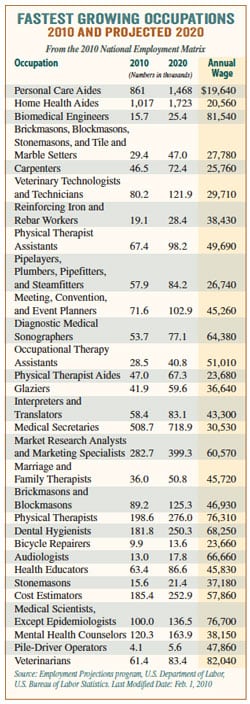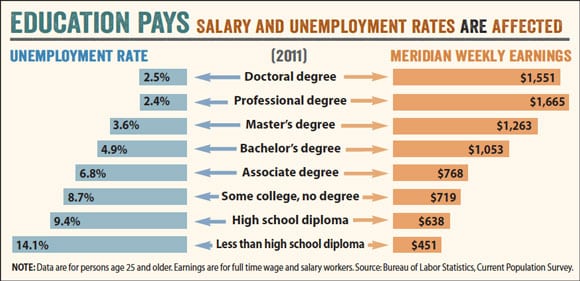Reinventing yourself in today’s job market
What is the best way to reinvent yourself? Here are some clues: The answer is not weight loss, a new wardrobe or even plastic surgery. It’s not created on Facebook or Twitter. Final clue: It’s been true for generations.
The answer is education. With corresponding increases in education, there is a distinctive rise in salary coupled with a decrease in unemployment — a pattern that has remained consistent for decades. The difference in the typical earnings of those with a high school education versus a college degree is substantial in just one year; over a lifetime, that gap can be breathtaking.

Consider Rebecca Akers. Rebecca grew up in small-town Pineville, Ky., surrounded by family and friends. In 2005, she left her childhood home to earn a psychology degree and then moved to bustling Erlanger (near Cincinnati, Ohio) with husband Brad, and they both landed good jobs.
For five years, the young couple flourished professionally but desperately missed their family and friends. Their homesickness prompted a life-altering decision: quit their jobs and move back to Pineville.
The Akers’ courage was rewarded. Both Rebecca and Brad found jobs, and they reaped the joy of having family close by. Rebecca particularly loves the fact that her grandparents all live within 10 miles.
However, the small town offered few good jobs in Rebecca’s field. After two years of a “so-so” job, she made yet another life-changing decision. At age 28, in the midst of what is often called the Great Recession, Rebecca went back to college — this time to become a registered nurse.
The domino effect
Rebecca didn’t just luck into a new future, however. Her decision to move back to her hometown facilitated a series of other choices, much as pushing over one domino can set off a chain reaction. In fact, Rebecca took many of the steps that counselors recommend for anyone looking for a career change.
She scoured the classified ads daily, getting a feel for the kind of jobs that were available. As she looked at each ad, Rebecca considered if she could “be one of those.” Although she repeatedly saw ads for nurses, she still didn’t leap into nursing. She talked extensively with friends who are nurses to learn the ups and downs of the profession. Rebecca also talked with counselors at a nearby university to help her determine if nursing would be a good fit.

Perhaps most importantly, Rebecca didn’t try to change herself to fit into a new profession. She found a new profession that fit her.
“Stay with what you love,” she advises others. “Don’t try to change who you are. Take who you are and find a career where you are needed.”
The final step was going back to school. Most career re-inventions require additional education. Counselors say to consider it an investment in you.
A little luck didn’t hurt either. In Rebecca’s case, the people skills and desire to help others that led her into psychology just happened to be a nice match for one of the most in-demand careers right now. Nurses are needed most everywhere, and that need will escalate as Baby Boomers age.
Nurses are paid well, and there are numerous opportunities to move up as you acquire more education. Rebecca, for example, plans to start as a registered nurse and then ultimately get a master’s degree in nursing to become a psychiatrist nurse practitioner. That, she says, will require five years of education but will result in a job that is an exciting blend of her psychology and nursing degrees.
Sometimes, just a little more education in a related field will give you new credentials and expanded opportunities. Such was the case with Kimberly and James Elam.
“In my previous career, I was a financial analyst in the healthcare industry,” says Kim. “My husband managed finance companies. In 1996, we opened our own mortgage broker company, but the mortgage industry quickly declined, leaving us unable to find a job or make a living for ourselves and our family.”
One after the other, Kim and James decided to enter a master’s of art in teaching (MAT) program. After completing 36 additional college hours in education courses, they were certified math teachers. MAT programs are designed specifically for adults who have careers but want to transition into teaching. Kim and James each earned 54 hours so they are certified to teach other subjects as well.
“I now teach sixth-, seventh- and eighth-grade mathematics intervention,” says Kim, “and my husband teaches seventh-grade mathematics and science. We love teaching and feel that our worst day of teaching is much better than our best day in the business world. Helping others is so much more worthwhile.”
Education required
If there is one key to reinventing your career, education is it. Ron Crouch, director of research and statistics for Workforce Kentucky and a highly respected demographer, has followed the correlation between education and jobs for decades.
This remains true in the current quirky economy, although Crouch says the real difference today is in the stability of the jobs.
“Education still pays,” Crouch says, “but the real news is that the less-educated are less likely to be working, and when they do find a job, they may find the salary for that job has dropped. Salaries are more stable in jobs that require more education.”
Sharon Lewis knows first-hand about how the job market has changed. She worked in the manufacturing sector — once known for stable jobs with living wages — from 1970 until 2009. Through no fault of her own, Lewis watched helplessly as three manufacturing jobs she held were moved overseas. Fed up, she concluded that it was time to take control of her career.
“I decided to pursue a career in computer applications technology since everything today has to do with computers,” writes Lewis. “I had limited knowledge of how a computer works, except for emails to my family, but I applied to National College of Business and was accepted. I was never a whiz kid when it came to getting good grades, but I applied myself to my schoolwork the same way I applied myself when I was in the workforce. To my amazement, I have a 4.0 grade point average (GPA) and have learned a lot about computers inside and out. I hope to become a manager in the computer field.”
Computer jobs have been darlings of the information age and remain firmly in the top five growth areas. Crouch, however, warns that there may be some rain in the otherwise sunny forecast for tech jobs.

“There are issues of automation and outsourcing connected to computer jobs today,” Crouch says. “The field is much more volatile than before. I know a lot of people with high skills who are searching for jobs.”
Conversely, manufacturing jobs such as the ones Lewis held may eventually make a comeback, according to Crouch.
“I think manufacturing will improve down the road,” the demographer says. “China and India both have some serious issues. China has kept labor costs down by not having a social security or health care system. Soon they will have an aging population with no resources put aside to care for them.
“Both China and India also have water issues. Most people believe that water is the new oil. Their water tables are low, and that favors parts of the United States with water. Middle America may fare much better than other areas because of our water resources.”
To do well economically, Crouch says the country has to get people producing durable goods.
“We have had a financialized economy,” he notes, “but we need plumbers, electricians and carpenters, too. We need to build things and create things.”

Geography, gender and jobs
Regardless of your career choice, Crouch advises people to examine prospective jobs from numerous perspectives, including geography, particularly if you want to live in a more rural area.
“Healthcare jobs are available most places,” he says, “but right now teaching jobs are not, for example. Some schools are laying off teachers because they can’t afford them. When the economy improves, we will need teachers. However, those jobs may not be as plentiful in some areas.”
There is also the issue of jobs and gender, according to Crouch, who says many jobs in demand today are in what have traditionally been female occupations — nursing and health care technicians, for example. Men are just as capable, of course, and may even be sought after — such as is the case with male nurses. It’s just another thing to consider.
Back in Pineville, Rebecca Akers remains excited about her future.
“My family is proud that I had the courage to go back to school,” Akers says, “and I am confident that I will be able to find a great job as a registered nurse when I am finished. This just proves that you should always be open to new opportunities and never settle for a job that you don’t love.”
Five steps to a better job in your state: Tennessee Career Centers
There are five steps to getting a good job or a better job, according to specialists at the Tennessee Department of Labor and Workforce Development:
- Find the Career Center near you.
- Get the right information.
- Take the right approach.
- Find the right job.
- Acquire the right training and education.
The steps are, indeed, like dominos. When you do all five, the dominos usually fall one by one. You win a great job. If you skip one, you may get a job, but it may not be perfect for you.
Tennesseans have access to free help with each of these steps through the state’s Career Centers, according to Jeff Hentschel, communications director for the Tennessee Department of Labor and Workforce Development.
Here’s a summary from the website:
 Find the Career Center near you
Find the Career Center near you
The system is designed so that every Tennessean lives within 30 minutes of a Career Center. Additional information can be found on the department’s website at www.tn.gov/labor-wfd/ or by calling the department at 615-741-6642.
Get the right information
The website includes job listings in each geographic area and across the state. It also has extensive labor market information about which occupations are the fastest-growing.
Take the right approach
Career Centers offer workshops on such topics as writing a better resume´, improving business communications, developing networking skills and making a good impression at interviews.
Find the right job
Professional publications written by experienced employment and training counselors can help you assess your skills, talents, aptitudes and job strengths. The centers also provide online resources such as Career Key and Career InfoNet to help you choose the right path.
Acquire the right training and education
In many cases, financial assistance may be available to get additional training and/or education. Personnel at the centers will help determine if you are eligible.
80,000-plus jobs
This year, the Tennessee Department of Labor and Workforce Development debuted a job database — with some 80,000 Tennessee jobs — called Jobs4TN.gov.
“It is very popular,” says Hentschel. “It utilizes spidering technology so we not only have jobs that are listed directly by employers but also jobs from major employers in Tennessee, job boards and listings for government agencies. The site also pulls in jobs from secondary sites such as Monster and CareerBuilder.”
“I’ve been involved in job-searching myself,” Hentschel says. “It’s difficult to find a job in Tennessee on the national sites. With Jobs4TN, you can find Tennessee jobs by category and location. There is also a virtual recruiter that will send you daily profiles of jobs and weekly notifications of new jobs. The service is free for employers and job-seekers as well. The national sites cost money.”
Are you a vet? Step right up.
Veterans have priority of service at the Career Centers. If there is a job posted from an employer, veterans receive the first notification.
Need a GED?
The GED test is changing dramatically in 2014, and if you haven’t earned your GED certificate by the end of 2013, you will have to start over with the process. None of the tests you have passed will count toward the new credential.
Adults needing a GED certificate can get free help through the Adult Education Division, which is also under the Department of Labor and Workforce Development.
Laid off? Dislocated? Between jobs?
Career Centers can also help if you are between jobs. Just click on Dislocated Worker Information for a wealth of self-directed information.




